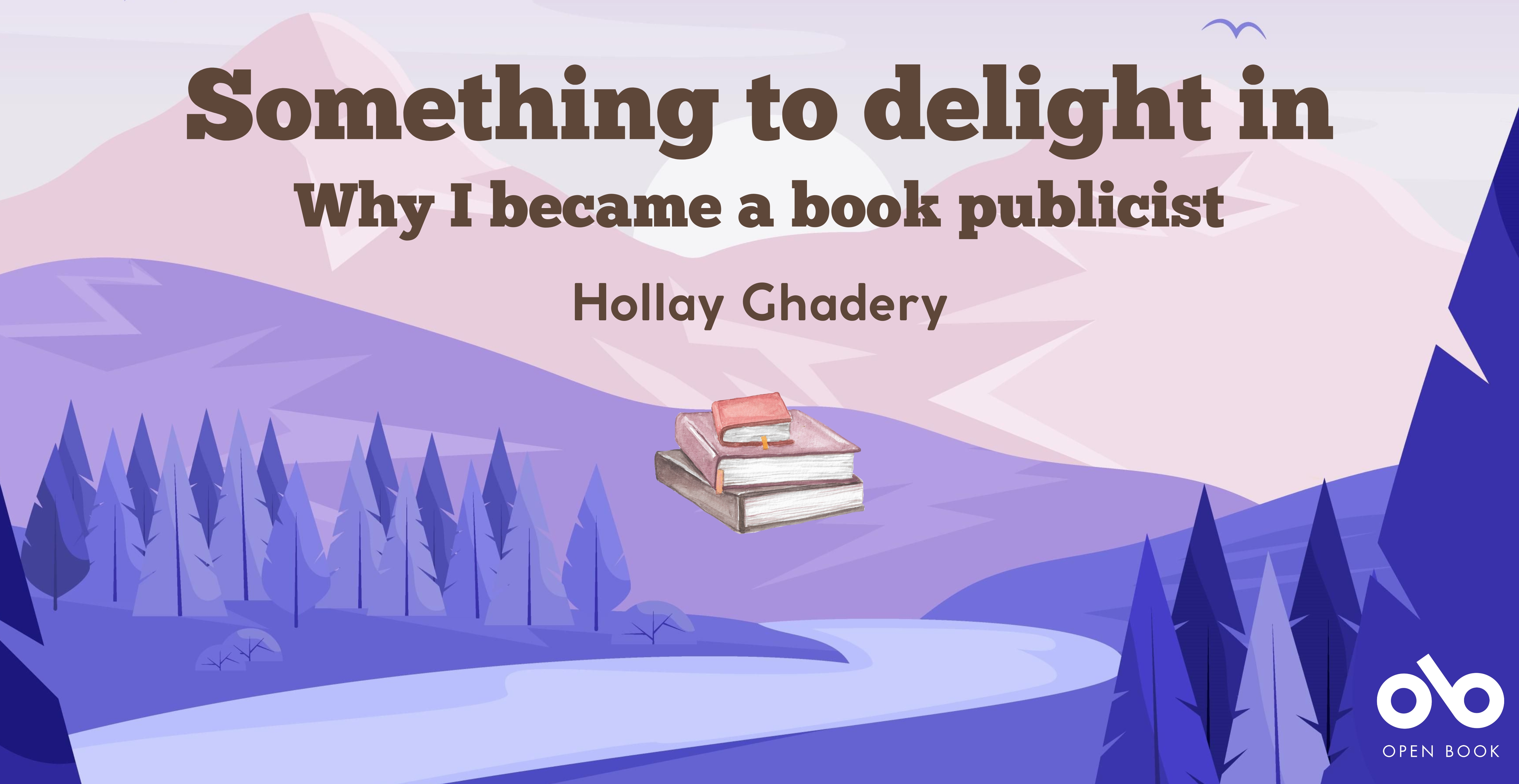Something to delight in: Why I became a book publicist
By Hollay Ghadery
From my bookish beginnings as an anxious kid who preferred the certainty of a good story to the probable humiliation of trying to make new friends, I always believed that making a career out of books was something I'd want to do. I took a creative writing course in high school, I studied English literature in university and did my MFA in Creative Writing. But when it came time to get a job, I found myself working as a freelance writer for digital marketing companies, and then later, as a communications and PR consultant for corporations with a company I created, River Street Writing.
Branding and publicity were my life, and this is where my career has been for almost two decades: in a steady, decent paying job, with nary a book in sight. During this time, I wrote two books and had a third accepted for publication but I knew that making an actual living as an author was, for most writers, impossible—especially for a writer like me with substantial overhead: four kids, three goats, two dogs and a lovely, but old home that always needs work.
Still, I assumed I'd end up in the book business. Somehow. Eventually. When I grew up.
Then everything changed a few months ago. One of my biggest consulting gigs dried up. I wasn’t sure what I was going to do but I really didn’t want to go back into corporate PR. I wanted to do something I felt passionately about, somewhere I could make a difference.
My dear friend—and one of my favourite contemporary Canadian women authors, Lucy E.M. Black—informed me, with the calm assuredness of her many years as a high-school principal, that I should become her book publicist.
And that made perfect sense of course. I had the skills, connections, and resources to do it. River Street Writing, in addition to consulting, had been doing editing and manuscript doctoring for CanLit authors over a decade. I knew writers. I knew publishers. I knew literary magazine editors and indie bookstore owners. I already had a team of creatives who were passionate about books who worked with me. I was ecstatic to make this change. But I was also determined to be careful.
As a writer, I had been in and around the CanLit community long enough to know that book publicity was a tougher than usual gig. Most authors aren't celebrities and selling them isn’t easy. Most presses don’t have the might of The Big Five. Book review sections are getting smaller. Funding for the arts is tight and competitive.
My first book, Fuse—a memoir of mixed-race identity and mental illness—was published during the first year of the pandemic, and I learned quickly how to get comfortable with self-promotion. I may have had dreams of writing alone in my attic like Jo March, sending my manuscript out into the world, and being an instant, overnight success, but that's not the way the world really works.
I saw my publisher, Guernica Editions, and other small press publishers manifesting publicity miracles on shoe-string budgets. I saw how overworked but unfailingly generous and passionate the people who run these presses are. I had always been dazzled by the authors they were publishing and the quality of their books, but I began to understand how truly incredible their efforts were. During this time, I was brought on as the Reviews Editor for the Minola Review, and I witnessed again how hard small presses work to get their titles the exposure they deserve, and how many small press authors were attempting to promote their books.
I spoke with my fellow River Street creatives about pivoting to focus on book publicity and they were on board: we were going to make working with CanLit small press publishers and authors a priority. Our rates would be scalable and transparent. Our approach, we decided, would not ignore traditional media outlets, but we’d also hone in on people and platforms more likely to give smaller press authors a shot. We’d amplify these authors and books in their communities so they could find niche connections and form deep readerships.
Your CanLit News
Subscribe to Open Book’s newsletter to get local book events, literary content, writing tips, and more in your inbox
And maybe it's because I grew up never feeling enough of any one thing to be completely anything—not Iranian enough to be Iranian, not white enough to be white, not queer enough to be queer or conventionally desirable enough to be desirable or normal enough to be accepted—maybe it’s because I’ve often felt overlooked and never want anyone else to feel that way, but I want the authors I represent to get the recognition they deserve so they can take their place in the literary world. If I don’t see an opportunity to do this, I’ll make my own.
In early July, I reached out to a connection I made years ago at a networking event, Frank Torres. He happens to own a radio station. A few radio stations actually. I mentioned what I was trying to do, and why I was so determined to do it. I mentioned the challenges I was facing. Within days, I found myself happily partnered with Uxbridge's legendary Blue Heron Books and 105.5 Hits FM, sponsoring a radio book club that amplifies authors from small press CanLit. Turns out one of the on-air hosts there really enjoys books. Never underestimate the love of a good reader.
Adele Wiseman, in her phenomenal memoir of creativity and motherhood, Old Woman at Play, wrote, "One of the characteristics I have noticed in creative people is that they retain about them something still alive of all the ages through which they have passed."
Yes, I am becoming a publicist for the CanLit community: the authors, small presses, and independent bookstores. To collaborate with and spotlight the literary journals and review platforms like the ones I have been lucky enough to work with as an editor or regular contributor: The Artisanal Writer, longcon, untethered magazine, CAROUSEL, The Miramichi Reader, and The Minola Review. Publications like these ones do so much heavy lifting when it comes to championing the astounding work coming out of small presses. More readers should know about them; should turn to them to find heir next great read, or fall in love with a new writer.
The need for committed and accessible book publicity is undeniable. Book sales and awareness should not be determined by big budgets and big publishers. I believe in my writers. I believe in their books. But I am also becoming a book publicist for my younger self: that quirky little kid who always had her head in a book and whose time spent reading was some of the best time spent in her life. She’s still mousing around, and I want to do something she will delight in.
The views expressed by Open Book columnists are those held by the authors and do not necessarily reflect the views of Open Book.
Hollay Ghadery is a multi-genre writer and book publicist living in Ontario on Anishinaabe land. She is also the Poet Laureate of Scugog Township. Fuse, her memoir of mixed-race identity and mental health, was released by Guernica Editions in 2021, her collection of poetry, Rebellion Box, with Radiant Press in 2023, and her collection of short fiction, Widow Fantasies, is scheduled for release with Gordon Hill Press in spring 2024. Her company, River Street Writing, specializes in book publicity for small presses and small press authors, manuscript and brand consulting, and more. Learn more about Hollay at www.hollayghadery.com and her company at www.riverstreetwriting.com.



